The Northman © Universal Pictures.
The Northman was another Hollywood movie that I wanted to see in theaters but missed. Just like The Last Duel, even if the movie ended up being bad (which they weren't), I wanted to see it in theaters to support the continued production of movies like this -- movies that aren't just another in the endless onslaught of comic book movies and nostalgia reboots from the late 80's and 90's. I want Hollywood to keep making these sorts of serious historic dramas.
But I haven't been to a movie theater in over 2 years thanks to the COVID pandemic. I would have been willing to go to the theaters for this (as well as for The Last Duel), but stuff kept coming up. We kept putting it off until, before we knew it, The Northman was out of theaters. But I'm no hypocrite. I also haven't seen any comic book movies in theaters either. I waited to see Spider-Man: No Way Home and The Batman until they were on streaming, and I still haven't seen Multiverse of Madness.
Much like The Last Duel, Northman is a brutal and dirty movie. Nobody gets blood-eagled, but there is plenty of violence, both grotesque and cathartic. Even the non-violent parts of the movie are grotesque and intense. Grown men built like trucks scream at each other, dance around, and even occasionally cry. This movie is constantly bombarding the audience with weird stuff, and it's all mesmerizing.
Northman threads a fine line between completely believable historical fiction and some mythological elements. On the one hand, I would believe the movie if it told me that it was inspired by true events. On the other hand, it's never entirely clear if the mythological content is actually supposed to be interpreted as really happening, of if they simply reflect the characters' belief in their gods and magics. Either way, the gritty, dirty, realistic settings are occasionally juxtaposed with beautiful and imaginative fantastical imagery.
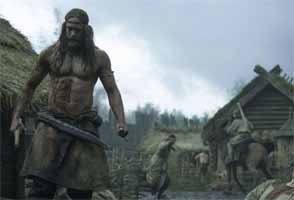 © Universal Pictures
© Universal Pictures
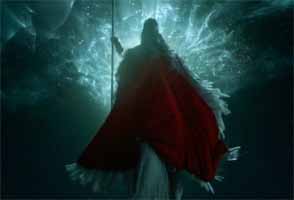 © Universal Pictures
© Universal Pictures
The gritty, realistic setting is juxtaposed with imaginative fantastical imagery.
[More]
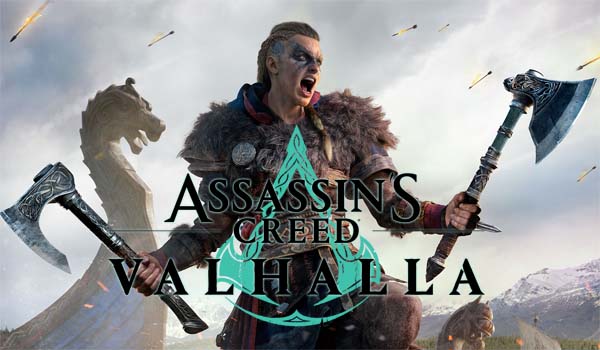
One of the thoughts that dominated my playtime with Assassin's Creed IV: Black Flag was "Oh I hope the next game is a viking-themed game!". I felt that the open-ended sailing and naval combat would work well in a viking setting, complete with raiding coastal villages as an extra way of obtaining wealth and loot (in addition to plundering trade ships in the open sea). Black Flag was so good, it seemed like a sure-fire, slam-dunk idea! What could possibly go wrong?
Well, it turns out: almost everything could go wrong.
I've been hoping for a viking-themed game ever since Black Flag.
For starters, I refused to buy Assassin's Creed: Valhalla at its release because I did not want to give any money to Ubisoft, which has had ongoing legal issues regarding multiple sexual harassment and sexual assault allegations against high-level managers and executives. Like the Catholic Church, Ubisoft may have systematically hid these alleged transgressions and protected the executives who were committing them. Even the company's HR department has been accused of being complicit.
So fuck Ubisoft and its executives, who (if these allegations are true) should all be in prison, and the company's ownership should be given to the employees who were wronged. I wasn't going to give that company a dime of my money, so I waited and watched eBay for cheaper, used copies to show up. I specifically filtered for "used" copies -- none of that "new, sealed" wholesale scalping nonsense that is all over eBay. Buying a sealed copy from an eBay scalper is the same as buying a new, retail copy, as far as I'm concerned. Several months after release, I finally bought a cheap, used copy for about $30 from someone who claimed to have played the game and got bored of it, so that my partner could kill time while stuck at home during the ongoing pandemic in 2021.
She played through the entire game, and liked it just fine. I played a little bit, hated the early hours, and stopped playing it so that I could work on other projects. I only came back to it later (after she had finished) to see if the game had any redeeming qualities. And even then, I did not even come close to completing the game because it's just too damn long, and I have much better things to do with my time.
You had one job, Valhalla! And you couldn't even get that right!
Assassin's Creed: Valhalla is a tedious, repetitive, drawn-out, copy-pasted, glitch-laden, slog of a game and story. It tries to copy the one thing that Black Flag did so well, and which inspired all future sailing mechanics for every Assassin's Creed game that followed, but it actually somehow manages to remove that thing! That's right, there is no naval combat in the game at all. Worse yet, there is absolutely nothing to do with the longship except use it as a vehicle for moving about the empty, sterile seas and rivers. There isn't even much in the way of islands to discover out in the open seas, so even the exploration incentive is gone. The Norway map has a few islands, but the England map has virtually none. In fact, you don't even use the longship to sail the seas around England; you only use it to sail up and down rivers looking for villages to raid. The key selling point of Valhalla, the longship, is nothing more than a glorified truck, and the rivers that run across England are basically just roads.
The longship is little more than a truck, and the rivers are little more than roads between raids.
Things are spaced out a bit more than I usually expect from an Assassin's Creed game. The map isn't quite as littered with mindless collectibles, even though it is still littered with mindless collectibles. But the map still isn't quite big enough, the distances still not quite far enough, and fast travel is still accessible enough, that I never felt it necessary to use the boat as the most efficient method of traversal. If you're stopping at every village to raid, to search for every collectible, and to play every side quest, then you're better off just using your horse, because any time you would save from using the boat will be offset by the extra time it takes to board and unboard the thing everytime you stop for a side quest.
It's like Ubisoft took the castle sieges from Middle-Earth: Shadow of War, stripped out the Nemesis system that gave those sieges context that made them worth playing, and then just put rivers between all the castle gates so you'd have an excuse to attack from the boat. But the longship feels completely unnecessary to the game. Early in the game, the longship feels like it might be a more integral part of the game, when you're sailing around the seas, fjords, and snaky coastlines of Norway, and crossing large bodies of water is necessary. But then you get to England, and the map is almost completely land-locked, save for those traversable rivers. [More]
b4e91cde-3344-4319-bff4-7a26ba6f0fdc|1|3.0
Tags:Assassin's Creed, Assassin's Creed: Valhalla, Assassin's Creed IV: Black Flag, Ubisoft, viking, Norway, Denmark, England, longship, open world, sailing, raid, pillage, plunder, monastery, Warner Brothers Interactive, patent, nemesis
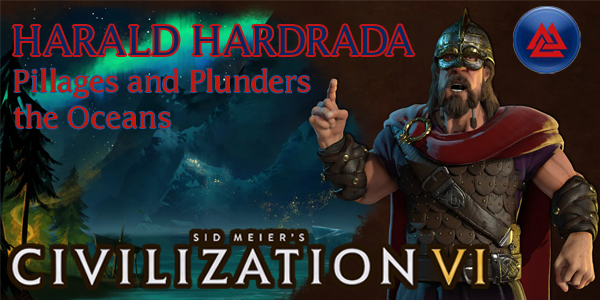
Now that I've covered all the civilizations which are new to the Civ franchise in the Gathering Storm expansion, I'm going to cover the other civs that my Patrons voted on. This guide will be for Viking King Harald Hardrada of Norway. Norway was included in the vanilla release of Civilization VI, but the strategies for playing as them (and all militaristic civs) changed considerably due to the loyalty mechanics introduced in the first expansion, Rise & Fall. The leader, Harald Hardrada, also had his Thunderbolt of the North ability enhanced by the Gathering Storm expansion.
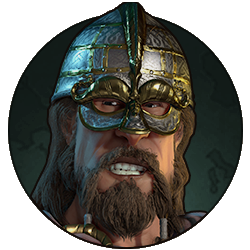
After the fall of the Western Roman Empire, migration out of the former Roman territories lead to a growth in population of the Scandinavian regions as the Medieval Warm Period made the frigid northern lands more amenable to agriculture. As populations grew, resources became scarce and piracy grew. The clans of Scandinavia began creating local or regional assemblies called "things", with the purpose of making laws, settling disputes, and directing the activity of pirates to territories outside of Scandinavia, eventually leading to a seasonal, sea-faring raiding culture. In 793 A.D., Norse raiders pillaged the English Catholic monastery at Lindisfarne, and kick-started the "Age of Vikings". Viking seafarers developed remarkably sea-worthy boats that allowed them to explore and colonize parts of the English isles, Iceland, Greenland, the Mediterranean, and they are even believed to have founded a short-lived colony in modern Canada.
The death of Harald Sigurdsson at the Battle of Stamford Bridge in England is often cited as marking the end of the Viking Age. Harald accumulated great wealth during his youth as a Byzantine Varangian Guard (a group of elite soldiers recruited from Northern Europe to protect the Eastern Roman Emperor). Upon returning to Norway, Harald inherited the throne from his nephew Magnus, and went on to unite Norway and institute a singular coinage economy that allowed Norway to enter into international trade. He earned the nickname "Hardrada" ("the hard ruler") for his stern rule, and propensity for using violence to put down internal opposition. He spent much of his life trying (unsuccessfully) to conquer Denmark before finally turning his attention to his fateful invasion of England.
DISCLAIMER:
Civilization VI is still a "living game". Strategies for the game (and for specific leaders and civs) may change as Firaxis applies balance patches, introduces new features, or expands the game through further DLC or expansion packs, or as the Civ community discovers new strategies or exploits. As such, the following strategy guide may change from time to time. I will try to keep it up-to-date, and will make notations whenever changes are made. I'll also post links in the official 2K forums and CivFanatics, where I'll also report any changes made. If possible and practical, I will try to retain the original content of the strategy for posterity.
I welcome any feedback or suggestions that readers wish to offer. Feel free to post on the linked forums, or by posting a comment at the bottom of the page.
This guide is up to date as of the release of the Gathering Storm expansion's "Red Death" (September 2019) (ver. 1.0.0.341)
Norway is an aggressive ocean-faring civilization that gets strong bonuses for raiding and pillaging. Their naval units can enter ocean tiles earlier in the game, allowing them to partially explore and settle other continents and meet distant civilizations sooner in the game.
[More]
1ac47dd8-bbc7-4458-ba2c-03bc2a17c30c|0|.0
Tags:Sid Meier's Civilization, Civilization VI, Norway, Viking, Harald Hardrada, knarr, thunderbolt of the north, berserker, stave church, Viking longship, last Viking king, navy, ocean, plunder, pillage, religion
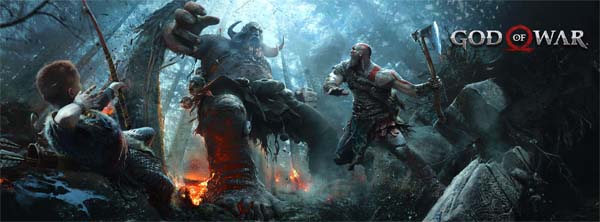
Vikings and norse mythology seems to have been a popular concept in games recently. Hellblade: Senua's Sacrifice, for instance, is an excellent hack-n-slash adventure through Norse hell. I've also been playing the Wasteland-like RPG Expeditions: Vikings on Steam (which I'm hoping to review soon). I also have games like Mount & Blad: Viking Conquest and Total War: Thrones of Britannia on my short list of games I'd like to play. And there was also the Viking character in For Honor.
Now, Sony's PlayStation flagship God of War has jumped from Greek mythology to Norse mythology. Having killed all the Greek gods, Kratos has apparently settled down in the mythological Midgard with a wife and son, only for his wife to die and his son be attacked by the Norse god Baldr. This sends Kratos and Atreus on a father-son bonding adventure to spread Atreus' mother's ashes from the highest peak in all the realms, and to learn why the Aesir are suddenly keen on hunting them.
Norse mythology seems to be a popular subject in media lately.
A father-son murder team
Atreus has some of the same problems that The Last of Us has with Ellie. Atreus doesn't feel vulnerable enough to demand protection, and he's rarely relevant outside of combat, except for his running commentary about what you're doing. Because of this, the actual game rarely feels like it's about protecting or escorting Atreus. And even though the game is ostensibly about Kratos teaching Atreus how to fight and be a man, the player never has an opportunity to actually teach the kid or take on any parental responsibility for him. It's just about Kratos throwing axes at draugr, and Atreus occasionally shoots them or jumps on their heads to help you out. The puzzle sections rarely require using Atreus (other than occasionally shooting something with his bow or having him scamper through a small tunnel).
Atreus is basically just an extra ranged attack.
That being said, I think that God of War makes some strides in the right direction (compared to The Last of Us). The player (and Kratos) can command Atreus to attack a target with his bow, which is one of the easiest and most consistent ways to deal stun damage to enemies, which opens them up to an intant-kill attack from Kratos. It's also a strategy that is pretty much essential on the harder difficulties. This creates a much greater sense of playing in tandem with Atreus, as he and Kratos often work together to defeat foes.
Atreus and Kratos can also break each other out of being grappled or stunned. I've never gotten a "Game Over" as a result of Atreus being defeated, so I'm not sure if that's a possible fail state. Being grappled or stunned only seemed to ever temporarily take Atreus out of the fight and negate the ability to use his bow. Either way, this is an improvement over Ellie from The Last of Us, who (as far as I recall) operated entirely independently from Joel, was never at any risk, and could be completely ignored for most of the player's time actually playing the game.
Kratos and Atreus can break each other out of enemy grapples and support each other in combat.
The important take-away here is that, unlike with Ellie in the combat encounters of The Last of Us, I never forgot that Atreus was there when playing God of War... [More]
569c96c8-73ad-4401-b3d2-4d2c9f75a74d|1|5.0
Tags:God of War, PlayStation 4, PS4, Sony, Sony Interactive Entertainment, exclusive, SCE Santa Monica Studio, sequel, Kratos, Atreus, Baldr, Freya, Magni, Modi, Midgard, World Serpent, escort quest, axe, Viking, Norse mythology, mythology, quicktime event, shifting the goalposts

Souvenir board game!!!
During a holiday in Europe, I procured a few souvenir board games to add to my collection.
I didn't have room in my luggage for the larger Stonehenge Anthology Game or the Ring of Stones game. So instead of buying them in the Stonehenge gift shop, I ordered them online and had them shipped to my house. They were both waiting for me when I returned home from the trip! The Ring of Stones game was purchased directly from the English Heritage online shop's Stonehenge gifts section. The Anthology game had to come from Amazon because it isn't available from the English Heritage online shop, but I got a really good deal on it!
There was also some Stonehenge Monopoly and playing cards, but I'm not into those sorts of novelty variations that I can get anywhere. It was the unique games that caught my eye.
The third game that I brought back from Europe is a medieval Viking game called "Hnefatafl". I had seen it in the Viking Ship Museum gift shop when I was there last November, but I didn't buy it at the time because I wasn't sure if its rules were written in English or Danish. I didn't want to buy a game that I'd never be able to play because I couldn't read the rules. So when I saw the same game in the British Museum's gift shop this summer, I decided to go ahead and get it.
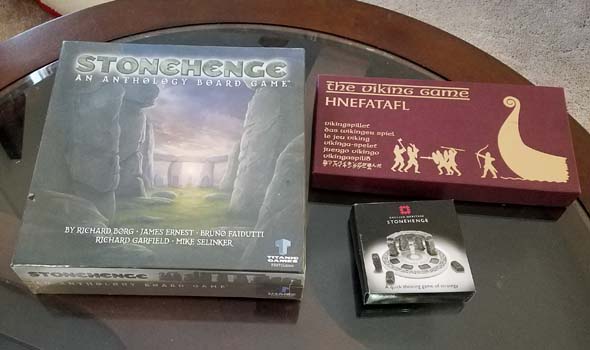
My European souvenir board games include 2 Stonehenge-themed games and a traditional Viking game.
I already talked about the Stonehenge Ring of Stones game and the anthology game, so today I will talk about the game that I should have bought in my first trip to Denmark: Hnefatafl (The Viking Game).
The Viking Game: Hnefatafl
While the previous Stonehenge-themed games are modern inventions, the Viking Game Hnefatafl (ne-fe-ta-fel) is a classic Norse game from the early middle ages. It was invented around 400 CE. It has some similarities to chess, but predates that game by at least 500 years. Besides, chess traces its lineage to India, so it's unlikely that Hnefatafl is a predecessor of chess.
Basically, Hnefatafl is an asymmetrical, chess-like game in which the single king and his defenders is ambushed and surrounded by the other player's pieces. All pieces move vertically or horizontally across the board (like rooks in chess), and pieces are killed/captured by flanking them on two opposing sides. The objective for the king's player is for the king to escape to any corner of the board; while the attacking player's objective is to defeat the king by surrounding it on all four orthogonally-adjacent spaces.
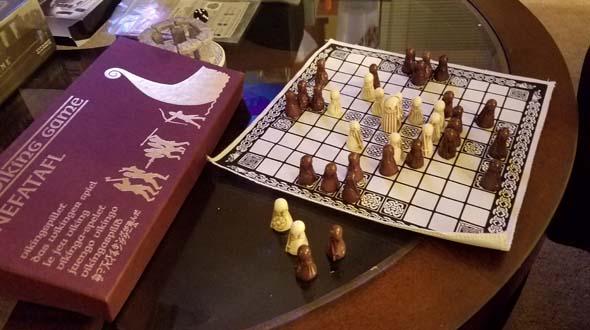
Hnefatafl is an asymmetrical, chess-like game in which a single king tries to escape from an ambush of attackers.
One of the things that makes the game a bit challenging (compared to chess) is that attacks can come from any direction, and every piece can hypothetically move the entire distance of the board... [More]
d734d0b3-ea54-41d2-9ce4-cdcc203a6765|0|.0
Tags:Hnefatafl, Viking Chess, the Viking game, Viking, chess, board game, king, pawn, rook, Denmark, Viking Ship Museum, Europe, ambush
|

| 12 | | | | | | | 60 | | 11 | | | | | | | 55 | | 10 | | | | | | | 50 | | 09 | | | | | | | 45 | | 08 | | | | | | | 40 | | 07 | | | | | | | 35 | | 06 | | | | | | | 30 | | 05 | | | | | | | 25 | | 04 | | | | | | | 20 | | 03 | | | | | | | 15 | | 02 | | | | | | | 10 | | 01 | | | | | | | 05 |
|